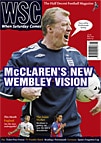 There are still some excellent webzines about, but the intervention of the real world – aka family life – is taking its toll. Ian Plenderleith talks to the duo who have retired with Watford at (well, nearly) the top
There are still some excellent webzines about, but the intervention of the real world – aka family life – is taking its toll. Ian Plenderleith talks to the duo who have retired with Watford at (well, nearly) the top
When the internet first became a part of our daily lives around the mid-1990s, everyone who thought they had an opinion worth hearing rushed to sign up and let the world know their views. Football fans were among the surge of previously disenfranchised citizens ready to exploit the new age of ultra-democracy and a million club webzines were born.
Launching a webzine was simple. You didn’t have to worry about needing much start-up capital, printing costs, or standing outside a ground on a wet day trying to interest your suffering fellow fans in forking out a quid to read your wonkily typed views on why the chairman should be tied to a ducking stool and dunked in the local lake.
If you surf around long enough, you can still find some of them, last updated March 4, 2001. The problem with something being so easy to start is that it’s so easy to jack it in, too. But apathy alone isn’t the reason why independent webzines are an increasing rarity.
If the webzine contributed to the decline of the printed fanzine (though some notable and hardy publications have endured), so the blog has helped end the era of the fan-written website. If you thought starting a website was comparatively easy, think about the ten minutes it takes to register at blogger.com, post your picture, create a profile, and then type in a match report that will appear within seconds against an expanding range of snazzy backdrops. Even for those fans who crave terracing, Bovril and the crack of a wooden rattle, the world has sped up.
If you’re still publishing a webzine, however, there are standards to keep up. There is such a mass of content on the internet now that you have to produce something quite special to hold your readers’ attention. The best surviving webzines are run by teams rather than individuals, because there are design, editing, small-scale advertising and quality of content to consider. For unpaid work, there is only so much time that a sane individual can devote to a hobby project.
One of the best ever webzines, Watford’s Blind, Stupid and Desperate, called it a day last autumn after a decade of quality coverage. Its co-founders, Matt Rowson and Ian Grant, decided to wrap the site up rather than let someone take it over who might not have maintained its reputation. “We couldn’t face the heartbreak of watching from the sidelines as the site slowly disintegrates,” they said in an apologetic parting letter to readers.
“I have an eight-month-old daughter and not enough time to sleep, let alone write about Watford,” concedes Rowson now. Although he does miss “the creative exercise – and the attention, if I’m honest”, he adds: “The guys who started up the original wave of websites, not wishing to cast any stereotypes, will generally now be older, perhaps married with families, with inevitable consequences.”
Grant agrees that “growing up” and “a very happy relationship” helped catalyse the webzine’s end, adding that “nothing prolongs the single life quite so effectively as needing to devote every Sunday to a vast, detailed and floridly metaphorical account of the previous day’s squalid defeat”. He also says it was “a weight lifted” when a firm decision was taken, but that “I’ll admit to howling my eyes out when I put the virtual pen down at the end of the (rather tired and emotional) last match report. There aren’t many things in life that are as personal and idiosyncratic and impractical as writing a fanzine, and it still feels like a little part of me is shut behind that door.”
As more and more editors leave their keyboards for the love of a good woman, there are bloggers, message-board ranters and established generic sites such as the inconsistent Rivals and FootyMad networks to fill the void, not to mention official club sites, which caught on rather late to the potential of a direct feed into the nation’s every home.
Yet the waning world of the webzine could also be down to the alternative outlets now available to channel the voice of the fans. Most forms of media have co-opted “the Fan’s View” into their mainstream; there are often fan reps on boards and supporters’ trusts involved in running many clubs; and sites such as The Football Fans’ Census (WSC 203) and Stand Up Sit Down (WSC 219) to campaign on the game’s political issues.
In that sense webzines, like their printed predecessors, may have done their job, or at least achieved as much as they could expect to. And while few of their readers or writers will be ready to take a seat in the Family Stand with the official match programme just yet, it seems that the days of the feral, passionate and sometimes literate webzine editors hunched over their keyboards until 3am may be numbered.
From WSC 243 May 2007. What was happening this month